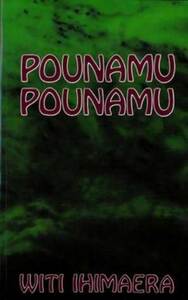Take a photo of a barcode or cover
emotional
informative
lighthearted
mysterious
reflective
relaxing
medium-paced
Plot or Character Driven:
Character
Strong character development:
N/A
Loveable characters:
Yes
Diverse cast of characters:
No
Flaws of characters a main focus:
No
emotional
funny
lighthearted
reflective
sad
fast-paced
funny
lighthearted
fast-paced
Plot or Character Driven:
Character
Loveable characters:
Yes
Diverse cast of characters:
Yes
A fun wee read from the Library of Mum and Dad. Love how the stories playfully explore Maori culture as well as the everyday experiences of Maori life and how they intersect with Pakeha culture.
A lovely anthology of short stories depicting Maori culture. I loved seeing the different points of view and the range of personalities. The Whale and The Child were very well executed. Yet Tangi and A Game of Cards became two of my favorite short stories of all-time. Tangi is the single-handed best use of flashbacks and dual narratives I've ever seen in literature.
emotional
funny
hopeful
informative
lighthearted
reflective
sad
medium-paced
Plot or Character Driven:
Character
Strong character development:
Yes
Loveable characters:
Yes
Diverse cast of characters:
Yes
Flaws of characters a main focus:
Yes
emotional
hopeful
informative
reflective
relaxing
sad
medium-paced
Plot or Character Driven:
Character
Strong character development:
Complicated
Loveable characters:
Yes
Diverse cast of characters:
Yes
Flaws of characters a main focus:
Complicated
I'm incredibly grateful Witi Ihimaera didn't bother listening to the second publisher he submitted this book to and thankful for his resilience.
I'm generally not someone that loves collections of short stories, so my engagement in reading this was inconsistent at best. The stories I loved very easily would have placed this among the list of my favourite books engari, there were some stories that lead me to putting this book down for months at a time. This is my first read of Ihimaera despite growing up on the adaptations of his work, it won't be the last.
I'm generally not someone that loves collections of short stories, so my engagement in reading this was inconsistent at best. The stories I loved very easily would have placed this among the list of my favourite books engari, there were some stories that lead me to putting this book down for months at a time. This is my first read of Ihimaera despite growing up on the adaptations of his work, it won't be the last.
challenging
emotional
hopeful
informative
inspiring
reflective
sad
fast-paced
Plot or Character Driven:
Character
Strong character development:
No
Loveable characters:
Yes
Diverse cast of characters:
Yes
Flaws of characters a main focus:
Complicated
This was the perfect time to read this book in this challenge. It turns out I was almost experiencing an element of Aussie literary homesickness. As much as I have loved some of the places I have been taken, and the stories I have been told, I longed for a familiar voice.
This book sated me while still opening my eyes to new experiences. Let me explain.
First and foremost, I love Kiwis and New Zealand. I find New Zealanders (or Kiwis to us Aussies) to be some of the most lovely people on the planet. They seem to have most of the qualities I love about Australians but with a slightly gentler spirit. Maybe that's what happens when you have nothing poisonous on your islands and all you native creatures are birds. But it was an eerily familiar voice in a different culture. And it helps when you read all the vowels the wrong way round so it sounds like a Kiwi accent. And I understood most of the English slang (not the Maori to begin with, but more on that later). It was home after being away so long. And that's leaving out the fact that New Zealand is one of the most beautiful parts of the world, which I was lucky enough to rely on my imagination for (although I have only been to the wrong island for this book).
My Mum picked up this book last time she was in NZ, and when I said I was doing this challenge and asked her and her husband for suggestions, they both recommended this book. I said "But Kiwi books would be the same as Aussie books though. I'm looking for something different". They assured me I was wrong and to read it. And I will admit they were right.
The short stories are written about traditional-ish Maori communities in the North Island of NZ around the 1960s. The kids are feeling the pull of Western culture and to the cities, where as the adults are concerned about the continuation of their communities and the cultural and religious traditions that are so completely intertwined to the communities. I find Maori culture fascinating (and I admit I have quite a few tikis in my ownership) and therefore wanted to know more about what was important and sacred to these communities. And Ihimaera does this in a way that is accessible for us. He also mingles Maori into the text, so before long you have picked up words in Maori and they no longer need to be explained.
It's brilliant writing. I'm not a huge fan of short stories, I get frustrated as I either don't find out enough so I don't engage with the story, or I engage and then feel cheated. But this didn't happen too often in this book. The stories are heartbreaking and so, so funny. One story about the Maori Hockey Tournament had me laughing so hard, even when I was rather sick. These warrior peoples, with the gentleness and politeness of not only their own culture but the general New Zealand-ness, competing with each other and their own little problems, was so hysterically well balanced and told it was a marvel.
I highly recommend it. I understand not everyone will be able to jump in with both feet like I was without the knowledge of us down in the Antipodes as well as the Kiwi's own interesting version of slang (which I will admit we mock them for. Jandles? Really?), but it is a wonderful introduction to one of my favourite places on earth, Maori culture and the problems that have faced Indigenous cultures all around the world, especially by those who have been invaded/colonised (choose your own term) by White Europeans.
For more reviews visit http://rusalkii.blogspot.com.au/
This book sated me while still opening my eyes to new experiences. Let me explain.
First and foremost, I love Kiwis and New Zealand. I find New Zealanders (or Kiwis to us Aussies) to be some of the most lovely people on the planet. They seem to have most of the qualities I love about Australians but with a slightly gentler spirit. Maybe that's what happens when you have nothing poisonous on your islands and all you native creatures are birds. But it was an eerily familiar voice in a different culture. And it helps when you read all the vowels the wrong way round so it sounds like a Kiwi accent. And I understood most of the English slang (not the Maori to begin with, but more on that later). It was home after being away so long. And that's leaving out the fact that New Zealand is one of the most beautiful parts of the world, which I was lucky enough to rely on my imagination for (although I have only been to the wrong island for this book).
My Mum picked up this book last time she was in NZ, and when I said I was doing this challenge and asked her and her husband for suggestions, they both recommended this book. I said "But Kiwi books would be the same as Aussie books though. I'm looking for something different". They assured me I was wrong and to read it. And I will admit they were right.
The short stories are written about traditional-ish Maori communities in the North Island of NZ around the 1960s. The kids are feeling the pull of Western culture and to the cities, where as the adults are concerned about the continuation of their communities and the cultural and religious traditions that are so completely intertwined to the communities. I find Maori culture fascinating (and I admit I have quite a few tikis in my ownership) and therefore wanted to know more about what was important and sacred to these communities. And Ihimaera does this in a way that is accessible for us. He also mingles Maori into the text, so before long you have picked up words in Maori and they no longer need to be explained.
It's brilliant writing. I'm not a huge fan of short stories, I get frustrated as I either don't find out enough so I don't engage with the story, or I engage and then feel cheated. But this didn't happen too often in this book. The stories are heartbreaking and so, so funny. One story about the Maori Hockey Tournament had me laughing so hard, even when I was rather sick. These warrior peoples, with the gentleness and politeness of not only their own culture but the general New Zealand-ness, competing with each other and their own little problems, was so hysterically well balanced and told it was a marvel.
I highly recommend it. I understand not everyone will be able to jump in with both feet like I was without the knowledge of us down in the Antipodes as well as the Kiwi's own interesting version of slang (which I will admit we mock them for. Jandles? Really?), but it is a wonderful introduction to one of my favourite places on earth, Maori culture and the problems that have faced Indigenous cultures all around the world, especially by those who have been invaded/colonised (choose your own term) by White Europeans.
For more reviews visit http://rusalkii.blogspot.com.au/
Maori stories about traditions, aroha (love), sharing, losing their culture as white people took over their lands.
The author's writing craft became more experienced over time, so the explanation of each story was better writing quality than some of the stories themselves.
The Whale story was vivid and emotional.
The author's writing craft became more experienced over time, so the explanation of each story was better writing quality than some of the stories themselves.
The Whale story was vivid and emotional.



